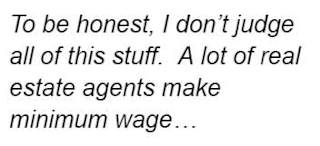Quick Summary
For those that prefer the short version first, here we go: the NAR settlement requires that all brokerages disclose their fees, ensure buyer's agents get compensated from their own clients rather than from the seller, allow consumers to negotiate their fees, and generally be more transparent.
Now for the long version of what the NAR settlement means:
How I Got into Real Estate
“Put that coffee down! Coffee's for closers only.” - from the movie Glengarry Glen Ross
The NAR lawsuit occurred because public sentiment is overall pretty negative towards real estate salespersons. One of the reasons it was fairly easy for me to get into the real estate sales profession was due to the industry’s reputation. I remember an early client of mine loved to quote the movie Glengarry Glen Ross whenever we’d meet up - he even gifted me a photo from the movie!
When I first started out, I didn’t even want to do real estate sales as I was trying to get my solo law practice off the ground. I started in 2007, right after I took the bar exam, and was paying $350/month to share a small room with a nearly retired attorney in an office suite run by Mark Vanger, a personal injury attorney who also happened to be the landlord of the office suite. He rented out 3-4 other rooms in the suite to other attorneys and I learned a lot in those days from my fellow suitemates, from how to sue insurance companies and settle without ever leaving the office, to how to avoid DUI convictions. There was an immigration attorney who won a tough immigration case for his Cape Verdean client years back, and now was the de facto Cape Verdean immigration attorney with lines out the door in his Boston satellite office. I think he hung out in the Cambridge suite to get away from the crowds. I’d pick up work from my suitemates here and there and became the main immigration interview attorney for the immigration guy. It was such a fantastic year for collecting stories, I felt like I was living a less glorious but personally exciting version of John Grisham’s Rainmaker.
Here are some of the highlights: I sued multiple sleazy landlords on behalf of friends and clients, saved someone’s mother from deportation, got an abused orphan their green card, and had a woman run out of her immigration interview when the USCIS officer threw a 5” thick binder on the desk and said it was full of incriminating evidence that the applicant was fraudulently pretending to marry someone to get them citizenship for cash. The first year of hanging my shingle was satisfying, nutty, paid the bills and kept me busy.
As a licensed attorney in Massachusetts, you can get your real estate broker’s license just by filling out some paperwork. I had always been interested in real estate since I bought and managed my own multi-family house a few years earlier, so I went ahead and filled out the paperwork. Then friends of mine found out, so they asked me to help them with their house sales and purchases. I didn’t know anything about real estate at the time, but they didn’t care. My sense is they wanted to (1) help their starving lawyer friend, and (2) work with someone they trusted rather than the typical real estate sleazebag.
Why does the real estate industry have a sleazy reputation?
“ABC. A - Always. B - Be. C - Closing. Always be closing.” - Glengarry Glen Ross

Historically, the real estate industry has always been known for its sleaziness with real estate agents just wanting to close deals regardless of the benefit or cost to their clients. The stereotypes of sleazy realtors are prevalent as everyone can point to an experience of being slimed by one. There’s the middle-aged salesperson wearing a Century 21 jacket with their name on a gold lapel pin asking everyone in the grocery store line if they know anyone that needs help selling their house, or the realtor at church who is constantly hawking every potential house transaction over coffee after service. These days you’ll see real estate agents talking about their business all over social media, plastering pictures of their clients in front of their new homes, or reposting their brokerage’s marketing materials on a weekly basis.
On a more technical note, until the 90s, real estate salespeople only worked for the seller. That was called “seller’s agency,” and agents that helped buyers were called subagents of the seller’s agent. The issue here is that many buyers didn’t realize their agent was working for the seller, and had a fiduciary responsibility towards the seller only. So the buyer’s agent was conditioned to just always work on closing the deal, since that was always in the seller’s interest and the seller’s agent would have the now infamous 6% fee as a standard commission fee.
In those days (and even now still in less cosmopolitan areas of the country), bigger brokerages had incredible leverage to monopolize their respective regions. They could hold inventory away from agents at smaller brokerages, and they’d use this to convince new clients and new agents that they all had to work at the dominant brokerage of the area. I’ve had my own agents deal with agents from big brokerages blocking roads into a neighborhood to our open houses when dealing in the suburbs, and throwing away our business cards at open business card kiosks. On a more corporate level, we saw a major new brokerage raise billions of dollars to buy out all the top agents from other brokerages and operate at a loss for years in order to monopolize various regions. The National Association of Realtors (NAR) has always had powerful lobbying abilities, which is one of the reasons why big brokerages were able to preserve these monopolistic practices.
The other angle which isn’t talked about in the recent NAR settlement news is the way NAR was able to keep independent contractor status for agents, which gives brokerages incredible tax breaks and cost savings. Attorney Richard Vetstein has a breakdown of this on his blog. The reason this is chronically litigated in the courts is that a lot of these traditional monopolistic brokerages grew their market share by treating their agents like employees without having to pay them for it – from mandatory meetings and fixed office hours, to dress codes and phones and other office tool requirements, in addition to strictly controlling their agents’ clients. NAR has been able to carve out a loophole in the IRS employee status for real estate brokerages to continue to be able to control their agents like employees.

To be honest, I don’t judge all of this stuff. A lot of real estate agents make minimum wage, and once you account for the wild fluctuations in the market and lack of benefits packages, it’s not an industry that is really carving out a ton of GDP. It’s an industry that rewards hard work, while allowing for flexibility to take care of one’s children, while still putting in 80 hours a week. It’s really a lot of independent contractors scraping out a living and successful agents working their tails off. And who doesn’t support small business culture? But admittedly, a lot of what consumers and smaller brokerages have experienced doesn’t fit with American free-market values.
Government efforts to clean up real estate sales industry
“Dave Moss: What's your name?
Blake: F— you! That's my name! You know why, mister? You drove a Hyundai to get here. I drove an $80,000 red BMW that's parked right outside. THAT'S my name” - Glengarry Glen Ross
The dynamic into the 90’s where there was only seller agency, i.e. all agents had a duty to the seller even if they looked like they were helping the buyer, is called subagency. The issue of subagency was hammered by many attorney generals throughout the country, which is why buyer’s agency and a set of disclosure laws were put in place in the 90’s. Every seller agent has to have a placard in place at every open house declaring who they work for, and who their associates work for. Every time a buyer’s agent starts working with a new buyer, they have to have a consumer disclosure form signed by that buyer before even discussing any particular house that’s on sale. All this worked towards protecting the consumer, both on the selling and buying side.
What happened recently was a continuation of this trend towards protecting the consumer. A couple things happened at once: the recent lawsuit, which is actually from 2019, finally made it through the courts, while at the same time NAR had multiple scandals as well as concurrent issues with declining membership. When everything washed out, real estate salespeople on a national level were no longer allowed to force a 6% commission, and now had to have signed buyer agreements with their clients that fully discloses how much the buyer is paying the buyer’s agent.
What now?
“Always tell the truth, George; it’s the easiest thing to remember.” - Glengarry Glen Ross
What does that mean for us here? It’s hard to say how general practices will change until the large corporate brokerages start setting precedent with their practices and figure out where the line is with enforcement of the new rules vs actual practice.

One of the goals of the NAR settlement was to make fees negotiable on both the buyer’s and seller’s side. We feel that fees have always been negotiable in our region. We’ve always disclosed our commissions in our initial buyer agreements, we’ve never charged 6%, and thanks to free-market dynamics of the city, we’ve always had companies like Zillow, Zip Realty, and Redfin help keep the market more competitive than in other parts of the country. This region has always had brokerages offering discounts of anywhere between 20% to 95% off the “standard” 6% commission to sell a property, and it’s arguable that the current agents that are able to charge more than others are able to convince consumers of their value, especially when operating in the more urban neighborhoods where it’s difficult for corporations to monopolize the market due to the constant influx of educated professionals and the younger generation who are drawn to quality and authenticity. Due to the relatively open market in this region for real estate services, fees have always been negotiable. Everyone sets their own fees based on the value they provide. That’s why people still hire us even though we’ve always charged more than Redfin. We also choose what we feel is a fair fee, which makes us more affordable than many corporate real estate agents. Over the years, we’ve adjusted our fees and increased our levels of service in order to stay competitive, while also making sure we’re charging for the value we provide. But given that fees have always varied widely here and have always been negotiable, we don’t foresee too many major changes especially for independent brokerages who have always had to compete against the corporate brokerages. The key in the NAR lawsuit is that there was a lack of competition in the areas the defendants were operating in.

The begging question in light of all the news about the NAR lawsuit is whether our fees are reasonable. Are our fees reasonable? Obviously our answer is yes, with our explanation below:
The begging question in light of all the news about the NAR lawsuit is whether our fees are reasonable. Are our fees reasonable? Obviously our answer is yes, with our explanation below:
The short answer is that in the Greater Boston area, there is a lot of competition amongst various brokerages combined with an overall well-educated buyer, seller and agent population. Recent articles point out that Cambridge is the highest educated city in the country, with 48% of residents over 25 years old having an engineering or science degree. We feel like the competition and free market dynamics dictate the commission rates pretty effectively. In our area, there have always been options to do for sale by owner (FSBO), discount brokerages, a la carte sales services, and more. Given that there are numerous options with varying fees, there appears to be a relatively open market with what these highly educated people are able to choose from, which means people mostly get what they pay for in terms of stress and overall success on a sale.
The longer answer is that we operate in an incredibly diverse housing market where one property can appreciate $100k more than a property 100 feet down the street over 3 years, and the fact that changing one’s mind on a property can cost 10x any real estate agent’s fee. Buying the wrong property without proper due diligence can cost a buyer over $100k in assessments or capital repairs. Our ability to educate our clients and analyze all the properties they are considering has proven to be the most valuable aspect of our service. We also manage a specialized team, so that we can virtually guarantee an accompanied showing any day any time, both on the seller’s side and the buyer’s side, which then frees up resources for me and Phil to be available for high level consultations pretty much any time of the day or night when a client needs to make a decision on a property.
Like many experienced agents in the area, it isn’t like the old days where you’re dependent on the schedule of one single person throughout your home search or sale process. For example, without working within a competent team, an agent can’t be available for most of the weekend since they would be out showing properties and attending home inspections and writing offers. But with our team, Phil and I are able to focus on strategy, analysis, and thorough consultations with our clients while still directing the other work via weekly meetings with our team and communications during off-peak hours when our clients are working or sleeping. We’re basically able to get a lot more work done than the average agent due to our team of specialists.

There’s still a lot of uncertainty around what exactly things will look like moving forward once the lawsuit’s changes take effect. The two main things we know are that commissions for buyers from the seller can no longer be guaranteed or marketed on MLS, and buyer’s agents have to disclose their fee in signed agreements with their buyer clients. We’ve always done the latter, and the former will be the main dynamic that we are waiting to see how it plays out. Some ideas and dynamics we’ve seen floating around the industry include the following:
- Buyer agents will have to write in their commission in every offer they submit, and the federal government will continue to allow all reasonable commissions to be rolled into the price of the property allowing financing of the commission as usual
- Same as #1 above, but the federal government will no longer allow the buyer’s side commission to be financed, and lenders will get more business by having more buyers requiring a second mortgage to supplement their down payment.
- Seller agents will notify all visitors to their listing about what commission the seller is offering. This seems to be a gray area, as some experts interpret the lawsuit settlement's purpose to be that seller agents no longer be allowed to set buyer’s agent’s commissions at all.
In the end, given the incredible lack of affordable housing or any housing at all, we don’t expect government entities to spend too much energy on the ramifications of the NAR lawsuit settlement. We’re seeing a lot of newer agents dropping out of the industry, as well as widespread layoffs of real estate brokerage employees and staff. Especially in areas like the Boston metro region where discount brokerages have competed for decades with the old school traditional brokerages, it’s entirely possible we just see a few tweaks in documentation and disclosure.



